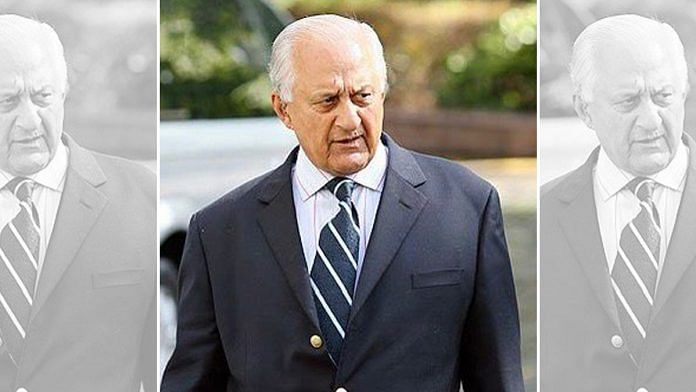New Delhi: For many, Shahryar Khan was a name synonymous with royalty, diplomacy and cricket. Former diplomats ThePrint spoke to remember him as a man who left an indelible mark on Pakistan’s history.
Sharat Sabharwal, India’s former High Commissioner to Pakistan, described the career diplomat, who breathed his last in Lahore on 23 March at age 89, six days before his 90th birthday, as a “thorough gentleman; a diplomat who you could talk to on difficult issues, emotional issues”.
Born in 1934 in Bhopal in British India, Shahryar Khan was the only son and heir of Nawab Muhammad Sarwar Ali Khan, the ruler of the erstwhile princely state of Kurwai, and Princess Begum Abida Sultan — eldest daughter of the last Nawab of Bhopal state.
In his book, The Begums of Bhopal, he wrote in great detail about the history of the erstwhile princely state of Bhopal.
Having enrolled at the Corpus Christi College at the University of Cambridge in 1952, he joined the Foreign Service of Pakistan in 1957.
He retired from the service in 1994 as foreign secretary.
Also Read: Should India talk to the new Pakistan govt? Imperfect peace is better than a crisis
Shahryar Khan, the ‘diplomat par excellence’
Among his early assignments was a posting in 1960 as Third Secretary at the Pakistani High Commission in London. From 1962 to 1966, he served as Second Secretary at Pakistan’s diplomatic mission in Tunis.
He became an ambassador in 1976, serving first in Jordan and then in the United Kingdom from 1987 to 1990. He also served as ambassador to France from 1999 to 2001. During this time, he was also chairman of the Foreign Service Reforms at Pakistan’s Ministry of Foreign Affairs.
“He was a great human being and a diplomat par excellence. Wherever he worked he left his mark. He was a people’s prince,” Abdul Basit, former High Commissioner of Pakistan to India, told ThePrint.
In 1994, Shahryar Khan also assumed the role of Special Representative of the then United States Secretary-General Boutros Boutros-Ghali, to Rwanda, which was ravaged by a genocide and a consequent refugee crisis.
This prompted him to write The Shallow Graves of Rwanda, in which he offered a firsthand account of his two years in Rwanda in the immediate aftermath of the downing of then Rwandan president Juvénal Habyarimana’s plane in April 1994 and the massacres that followed.
Given his credentials, then Pakistan prime minister Nawaz Sharif in 2013 appointed Khan as his special representative for Track-II diplomacy with India. According to T.C.A. Raghavan, former Indian High Commissioner to Pakistan, Khan was “highly regarded by his interlocutors in India”.
“I came to know Shahryar Khan in 2003 when I was first posted to Pakistan as deputy high commissioner. In time we became good friends and he was to me a highly regarded senior colleague. In my assessment Shahryar Khan stood out for the poise and dignity he brought to bear on his professional life as a diplomat. He was highly regarded by his interlocutors in India and represented a genuinely enlightened strand amongst Pakistani diplomats of his generation,” diplomat-turned-author T.C.A. Raghavan told ThePrint.
“Personally convinced of the imperative need for a more stable and improved India-Pakistan relationship, he (Khan) approached the task with sobriety and maturity, conscious of the difficulties but with the conviction that an honourable way forward acceptable to both sides was possible.”
Not many know that Khan was enrolled at the Royal Indian Military College in Dehradun and later at the Daly College in Indore. It was only after his parents separated that he migrated to Pakistan along with his mother. It is also a lesser-known fact that he was the cousin of former Indian Test cricket team captain Mansoor Ali Khan Pataudi.
When ‘Pakistan cricket made most sense’
It was not just statecraft but his presence in the world of cricket which added to Shahryar Khan’s fame. He served as chairman of the Pakistan Cricket Board twice, from 2003 to 2006 and again from 2014 to 2017.
Notably, it was during his tenure that Pakistan hosted India for two tours, marking a thaw in bilateral ties. He also took on the role of Pakistan team manager during the team’s tours of India in 1999 and again in 2003.
“He was a democrat but worked as chairman of an ad-hoc board in his first stint under the military dictatorship of the late Pervez Musharraf,” Osman Samiuddin, senior editor with ESPN Cricinfo, wrote in a tribute to Shahryar Khan. “In time I think we’ll come to appreciate Shaharyar Saab’s two stints this century as the times Pakistan cricket made most sense,” he wrote on X.
It was also during Khan’s tenure as PCB chairman that Pakistan forfeited a Test match against England at the Oval after it was penalised for ball tampering.
Faizan Lakhani, deputy editor (sports) at Karachi-based GEO News, recalled the time he was chasing Khan for a comment on a cricket match between India and Pakistan. “I knew I was becoming too irritating, but he remained polite and said to me ‘har khabar zaroori nahi ki waqt se pehle de di jaye’ (it’s not necessary that everything be told ahead of time).”
Emphasising Khan’s role in bridging the gap between the two countries, Lakhani told ThePrint, “During his first tenure, he ensured that the India team visited Pakistan. In his second tenure, he took measures to bring cricket back to Pakistan which resulted in Zimbabwe’s tour to Pakistan.”
(Edited by Amrtansh Arora)
Also Read: England spinner Shoaib Bashir finally gets Indian visa but here’s why it was delayed



